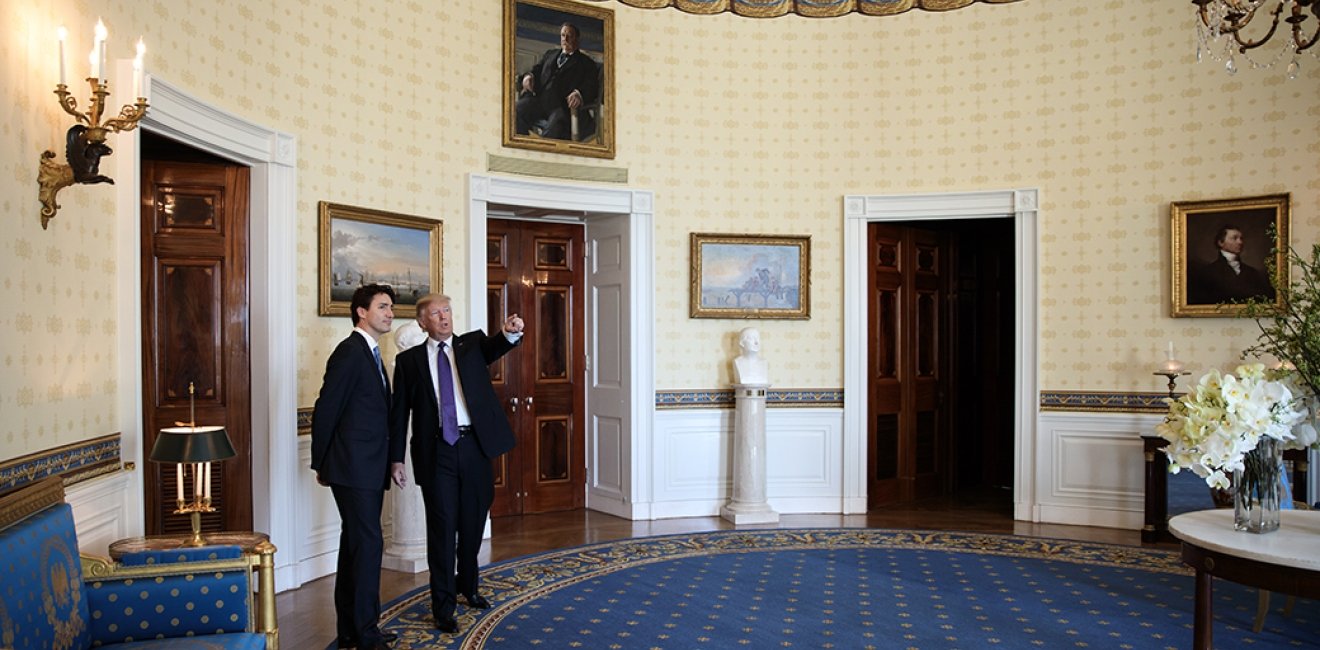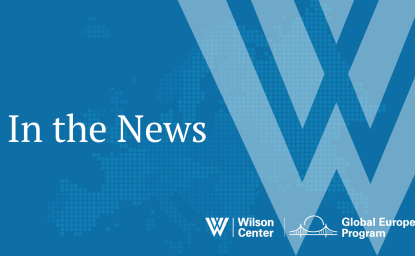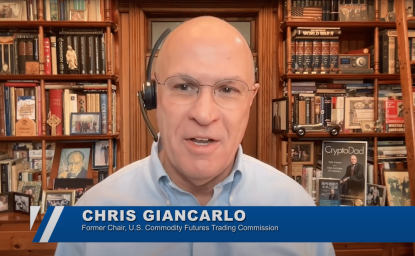With the U.S. election results now finalized—giving clarity on the House, Senate, and President—the priorities for Canada in "Washington’s inbox" are taking shape. As the next administration and the 119th Congress prepare to tackle pressing domestic and international challenges, we invited experts to share their insights on what lies ahead for U.S.-Canada relations.
Trump 2.0 and the Macroeconomic Policy Challenge to Canada
Jim Haley
Global Fellow, Canada Institute
Recent intemperate and ill-conceived comments by the president-elect make it clear that Canada will confront serious macroeconomic challenges from the Trump 2.0 administration.
The first challenge is how to respond to the unilateral declaration of a tariff war by the US.
The president-elect has threatened to impose large tariffs on Canada and Mexico, with whom the United States negotiated a renewal of the North American Free Trade Agreement (NAFTA) during his first administration. Punitive tariffs would harm US consumers since tariffs represent a tax on consumption, not withstanding the claims made by Trump. But these negative effects are presumably viewed as the cost of enhancing the US bargaining position in advance of the review of NAFTA agreement that is scheduled for 2026. The purported justification for Trump’s belligerence, meanwhile, is Canada’s balance of trade surplus with the US, which belies profound ignorance of the underlying macroeconomic source of such imbalances or deliberate dissembling, or both. In any event, in this zero-sum game perspective, the fact that trade creates mutual benefits—perhaps the most fundamental proposition in economics—is besides the point: if Canada benefits from current trade arrangements, it must be to the disadvantage of the US.
Should the Trump 2.0 administration follow through with its threats, there would inevitably be pressure on Canada to retaliate tit-for-tat; indeed, the Canadian government has already indicated that a forceful response can be expected. Yet however understandable it may be in a political context, that response could be a mistake. This is because US tariffs would have a deflationary effect as demand for Canadian goods declines and output falls. Those effects would put downward pressure on prices, creating room for the Bank of Canada to cut interest rates more aggressively than currently envisioned to keep inflation within its inflation target (or hold off on interest rates hikes that would otherwise be necessary). Lower interest rates would boost output in interest sensitive sectors of the economy offsetting the tariff-induced contraction in output.
If Canada responds to US tariffs with tariffs on US goods, however, the opening for accommodative monetary policy is narrowed. Retaliation by Canada would represent a self-inflicted inflationary shock, one that the Bank of Canada would have to incorporate in setting monetary policy. Rather than monetary stimulus monetary conditions would have to be tightened relative to the case in which Canada does not respond to US tariffs. Otherwise, the Bank of Canada runs the risk of inflation rising above its’ inflation target. Under that scenario, interest-sensitive sectors of the economy and homeowners struggling with mortgage payments are negatively affected. And it implies an additional negative shock to output.
Perhaps most salient for a government with a new leader facing an election and languishing in public opinion polls, a scenario in which inflation once again spikes higher could preclude any hope of re-election. That surely is a key lesson from the November 2024 general election in the US.
Addressing Illegal Third Country Immigration from Canada to the United States
Richard M. Sanders
Global Fellow, Canada Institute
Illegal immigration across the US southern border has been one of the hottest issues in American politics. But we are also seeing an upsurge in illegal immigrants from third countries entering the United States across the northern border. Although, in absolute terms, the numbers crossing from Canada are not enormous, they have the potential to create bilateral friction if authorities cannot successfully stem these flows.
From October 2023 to July 2024, US Customs and Border Patrol (CBP) reported 19,498 encounters with illegal crossers from Canada, compared to 7,630 during the same period in the previous year. Although these border crossers come from all over the world, the largest numbers are from Mexico and India.
While examples can be found across the 5,500-mile-long border, crossings are concentrated in Northern New York, Vermont, and New Hampshire. Ironically, until recently, the issue causing tension was illegal crossings in the opposite direction, as third-country nationals present in the United States under “Temporary Protected Status” sought to enter Canada and claim asylum, fearing this status would be revoked.
Changes in the relevant US-Canada agreement have seemingly resolved that issue. However, the problem of southbound crossings is less susceptible to a simple legal fix; rather, it is one of enforcement. The US Border Patrol complains of being overstretched despite additional positions being created, while on the Canadian side, the RCMP also needs more resources.
The question arises as to how these illegal border crossers entered Canada in the first place. Canada has visa requirements for would-be travelers from a range of countries, including Mexico (whose visa-free status was revoked earlier this year). Thus, if the number of persons holding Canadian visas and then seeking to illegally enter the United States is to be reduced, the criteria Canada uses to grant such visas may need to be toughened.
This could entail political costs. India, for example, is an important trading partner of Canada; at the same time, bilateral relations are already tense, with Indian operatives accused of assassinating a Sikh activist in British Columbia in 2023. Making it more challenging to obtain Canadian visas will only strain ties further.
Intensifying enforcement along the border will not be easy. Although it lacks the scorching deserts of the US-Mexico border, it has instead dense forests and harsh winters. Border crossers have suffered serious injury from exposure to the element and, in some cases, lost their lives. Moreover, law enforcement must confront sophisticated human smuggling rings that may also be engaged in narcotics and weapons trafficking.
Perfection will not be found, but it is in the interest of both Canada and the United States to make progress on this issue before it becomes a more serious irritant.
The potential impacts of the results of the US Presidential Election on International Higher Education in Canada
Gisèle Yasmeen
Global Fellow, Canada Institute
You wouldn’t know it from the media coverage, but higher education was indeed on the ballot during the recent US election. What did the two campaigns have to say about higher education, and international higher education specifically? And what might be the impacts on Canada? As our societies and economies are so intertwined, I would like to see this unpacked, especially given that we now have the results of the election -- a Trump Presidency and a GOP majority in the House and Senate. The following reflections are offered as material for debate and deeper analysis going forward.
The Republican and Democratic positions on higher education in general were recently analyzed in The Chronicle of Higher Education as well as The Conversation. Controversies around immigration obviously impact recruitment of international students, as do responses to campus protests surrounding the Israel-Hamas war. The Trump and Harris campaigns positioned differently on both issues. Trump has vowed to make drastic changes, including shutting down the Department of Education and rolling back protections for LGBTQI+ students.
The model on which Canadian post-secondary institutions have become deeply dependent -- “Edugration,” or the recruitment of international students with a path to permanent residency -- is in serious peril. Given caps on international student permits announced in January this year, when the Government of Canada’s proposed Trusted/Recognized Institutions framework was put on hold, Canadian universities and colleges now face at least 45% decreases in revenue and, given the further cuts announced recently in September, will no doubt see further declines going forward. Geopolitical tensions with China and India further aggravate matters. Given that these countries represent half the world's population, anything that compromises the relationships between the US, Canada, and these countries with respect to higher education and research has devastating scientific and economic consequences.
Immigration is a hot-button issue in both countries. But the US and Canada need to be part of the global knowledge economy, and foreign students generate foreign knowledge exchange, like exports. In Mexico and Canada, post-secondary institutions are facing serious financial challenges that go beyond dependence on dwindling foreign student enrollments. These dire financial circumstances are the result of declining financial support from a variety of sources, particularly state or provincial governments. According to Rick Seltzer, in the US, "the sector's already losing 10 to 20 colleges a year". Taking stock of reader comments on op-eds in American and Canadian publications pushing for greater public funding of post-secondary institutions shows that there is little public support for universities. Yet, higher education has traditionally been a path to a better life.
Regardless of political stripe, one thing is clear: We are part of a global knowledge economy. How can higher education institutions in the US and Canada win the hearts and minds of voters across the political divide? What deep transformations are needed to bring the sector into the 21st century technologically, in terms of both governance and value, particularly concerning public funding? We've got work to do.
Canada’s Job Number 1: Protect The Integrated Economy
Danielle Goldfarb
Global Fellow, Canada Institute
Donald Trump’s decisive win and Cabinet picks are sending shockwaves through Canada, leaving policymakers, business leaders, and citizens deeply apprehensive about the next four years and beyond.
Trump’s proposed policies will severely impact Canada’s economy. Canada is a small, open economy that depends on access to the US market to maintain and grow its citizens’ living standards. Why invest in Canada to serve the much larger US market if your business is penalized every time a product crosses the border?
The country’s top agenda item for this new administration is, therefore, defensive: protecting the country’s relatively free access to the US market. This means two key things: securing a full exemption from Trump’s proposed tariffs and renewing the United States-Mexico-Canada Agreement (USMCA).
Like everyone else, Canadians are coming to the realization that the President-Elect is going to do what he says he is going to do. On trade, he promised 10-20 percent tariffs on products from all countries. If applied to Canadian products, this would reverse an almost sixty-year policy of Canada-US free trade and cross-border production.
The economies are deeply integrated: almost two-thirds of Canadian exports to the US and half of US exports to Canada are intermediate inputs. Canadian leaders will need to convince Trump that exempting Canadian imports benefits Americans. Applying tariffs would penalize US companies reliant on Canadian imports for inputs. Tariffs will reduce GDP and increase consumer prices in both countries, with even harsher impacts if and when Canada retaliates. Businesses on both sides of the border are likely to stockpile inventory, rush shipments, or even duplicate facilities.
Looming in July 2026 is the review of the USMCA. Canada’s agenda will be to renew the agreement for another round (16 years) or at least for as long as possible. The goal will be to avoid withdrawal from the agreement or a one-year renewal type cycle. Without certainty over the future of the deal, businesses have fewer incentives to invest in Canada.
Trump seems likely to link tariff exemption to concessions under the deal’s review. One obvious candidate is access to Canada’s highly protected supply managed sectors including dairy. This would be great news for Canadian consumers, but politically difficult in Canada even if as expected the Conservative party wins the next Canadian election.
Canada may also propose strengthening the deal for the digital and AI economies. As an AI research leader and small economy, Canada has a strong interest in free trade in data and computing as well as alignment on basic rules to prevent AI risks. The deal already protects cross-border data flow, but Canada would want to make sure that it stays the same (in view of the US unexpectedly reversing its free trade position at the WTO on this front). Advances in AI could also reinforce supply chain security and streamline border operations for a more frictionless next-generation border experience.
But the Canadian agenda is not limited to agenda items for US officials. Canadian leaders are already reconsidering everything from traditional alliances to whether they should look to align with standards outside of North America and ways this country can benefit from openness to the world as the US turns inwards.
How Are Mexico and Canada Positioned for a Second Trump Term?
Diego Marroquín Bitar
Bersin-Foster North America Scholar
Few nations are more exposed to a second Trump term than Mexico and Canada. Both rely heavily on the US market, with over a third of each country’s GDP tied to exports —more than 80% of which are destined for the US. However, Mexico’s exposure is particularly pronounced, underscored by the peso’s sharp drop against the dollar shortly after election day, declining over 3% in a single day.
A second Trump administration, strengthened by greater congressional support and less moderate voices in his cabinet, would face fewer constraints in following through on campaign proposals. Proposed measures include mass deportations of up to four million undocumented Mexicans, which could cost Mexico billions in remittances; a 500% tariff on Chinese companies manufacturing in Mexico, even if compliant with USMCA rule; and a blanket tariff of at least 25% on all Mexican imports. Such actions would severely impact US consumers and North American producers, as tariffs are regressive measures that threaten North America’s competitive edge against China, as well as the credibility of our region’s economic backbone: the CUSMA/ACEUM. Again, campaign rhetoric suggests that Mexico, more so than Canada, is the primary target.
Canada, however, may be better positioned to negotiate. Potential concessions like adjustments to its supply management system, abandoning the digital services tax, or committing to increased defense spending to meet NATO obligations could help Canada secure preferential market access. In contrast, Mexico faces more constraints. With a growing list of trade disputes and security challenges, its negotiating position is limited, leaving it more vulnerable to US trade and immigration pressures.
Contributors

Former IMF Director for Canada, Ireland, and the Caribbean

Former member of the Senior Foreign Service of the U.S. Department of State

Senior Fellow, Centre for International Governance and Innovation; Distinguished Fellow, Asia Pacific Foundation of Canada

Former Higher Education and Research Executive and active Board Director/Advisor


Canada Institute
The mission of the Wilson Center's Canada Institute is to raise the level of knowledge of Canada in the United States, particularly within the Washington, DC policy community. Research projects, initiatives, podcasts, and publications cover contemporary Canada, US-Canadian relations, North American political economy, and Canada's global role as it intersects with US national interests. Read more







